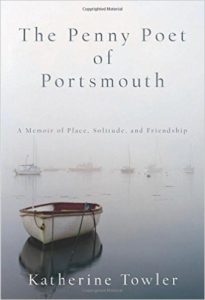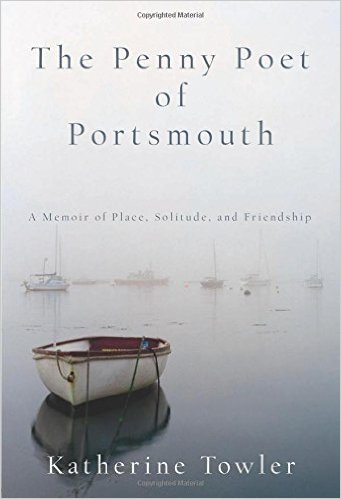The Penny Poet of Portsmouth
 by Katherine Towler,
by Katherine Towler,
Counterpoint Press, 2016,
282 pages, paper, $16.95,
ISBN: 978-1-61902-712-1
Buy the Book
In the hands of the most gifted memoirist, (seemingly) ordinary lives are shaped into extraordinary lives; their subjects becoming through the telling of their stories larger than life — perhaps even mythical — when taken in full context, to include post-scripted entries made during those immediate years after the subject has passed away. You’ve heard of The Great American Novel? Well, this is The Great American Memoir, one that does not have to depend upon hyperbole and invention to make it a compelling read.
The Penny Poet of Portsmouth is not simply an amassed collection of anecdotes and stories about Robert Dunn as told by the author. Dunn is very much alive and speaking throughout the entire memoir in his own words via actual spoken dialogue between he and Towler, between the quotation marks. If but one sentence spoken by the man himself defines his destined purpose on this earth, it would be from page 200: “Without poetry, I do not see that life is worth living.” Towler’s relationship to Dunn could arguably be defined as the role of Zen student to Roshi master.
Towler manages also to reveal to us the full spectrum of how a writer must live in order to produce a lasting and valuable body of work, the daily balancing act of securing the critical alone time to write while having to accomplish the necessary mundane chores and still find the time for spouse, family, and community friendships. It should be stated here that Dunn, though an amazingly gifted poet and genuine fey presence in his own right, was not a saint. He could at times be very demanding and passive aggressive, and that in turn imposed an ongoing burden of guilt upon Towler, who was not only a friend but took on the role of errand runner and caretaker to Dunn during his last few years, as his health began to rapidly decline. From the notebooks of Robert Dunn:
The most hideous moments of the last judgment might be the
discovery that I had barely tolerated people who are much
better than I. It would be such a loss not to delight in the
differences. People are strong and weak, wise and foolish, here
and there.
Towler’s memoir (she is also a novelist and poet) is almost as much about the growing pains in the evolution of Portsmouth, New Hampshire, from circa 1990 to the present day, as it is about Robert Dunn, a recognizable fixture who could almost daily be seen strolling the downtown streets or sitting on a public bench. Dunn was a throwback, a modern day Basho, and a Luddite of sorts. Though physically diminutive, Dunn was a cerebral titan: “He was able to read French, German, Latin, and Greek, though he never studied any of these languages, except perhaps briefly, in school.” He composed each of his poems in his head over a period of two to three months and was able to recite all of his poems from memory. He committed a certain number of poems to paper in the form of small handmade books to sell for a penny to his friends (hence the book’s title) or to send off to literary magazines. One can only imagine how many poems died with the man, poems that were never captured on paper. Dunn was amazingly tough as well, having stoically survived through COPD, a collapsed lung, pneumonia, a broken hip, and congestive heart disease before passing away in 2008 at the age of 65. The Penny Poet of Portsmouth includes many excerpts from poems, complete poems, and notebook entries. Here is one poem in full, and typical of most all of Dunn’s poems, untitled:
Walking by day through the
Historic District you feel uneasy,
as though someone was trying to
tell you something, and that untrue.
But at night the whispers tell
how Flash Charley passed out right
in Pig Turd Alley, and what
Gimlet Alice said to the piano
player before she and everyone else
stopped being.
For those who wish to obtain and read a well-edited selection of Dunn’s published work, one need go no further than to pick up a copy of his 2016 Selected Poems, One Of Us Is Lost, from Hobblebush Books.
— Wayne Atherton


